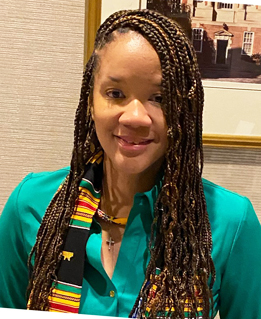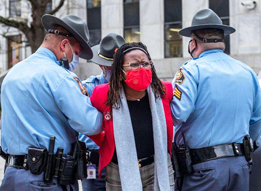By Fletcher Word
Sojourner’s Truth Editor

One Small Step Forward in Illinois
The City Council of Evanston, Illinois, a city of about 75,000 residents, passed legislation last week that will start the process of reparations for those descendants of the victims of enslavement, the victims of the reign of Jim Crow and disenfranchisement in the post Reconstruction period as well as the victims of redlining legislation and policies starting in the 1930s.
The Evanston plan was devised by Alderman Robin Rue Simmons and her fellow council members. The legislation will direct funds from the revenues generated by the tax on legalized cannabis into assistance for home purchases, mortgages and home maintenance costs.
Initially an amount of $400,000 has been earmarked for the program in which amounts of up to $25,000 will be distributed to eligible individuals – part of eligibility requirements would be proving residency in Evanston for a specified length of time. Eventually the amount of funds that will go into the program is expected to exceed $10 million.
Simmons determined through her research that the racial wealth gap was the critical component of a lack of equity and inclusion, so she reached out to the National African-American Reparations Commission (NAARC) convener and Institute of the Black World 21st Century (IBW) President Ron Daniels to help the city develop the plan. The key to the plan – and therefore to narrow the wealth gap – was to assist Black families in their quest for homeownership.
The Federal Reserve’s Survey of Consumer Finances put the net wealth of the average White family at $171,000 in 2016 and $17,150 for a Black family.
The Evanston City Council has not been met with overall approval in the Black community. A group called Evanston Rejects Racist Reparations (E3R) argues that the plan does not go nearly far enough since the funds appropriated will only be disbursed to a handful of the more than 12,000 African American Evanston residents.
One of the other key objections to the plan is tagging the payments to home ownership. Some opponents of the plan say that Black recipients should not be told how to spend their reparations payments.
Simmons disagrees with those assessments citing the time and effort that her groups has invested in identifying the past history of anti-Black housing practices in the city – a history that marked the path for reparations.
Still, Simmons and her allies acknowledge that mush more should be and will be in the continuing reparations effort.
Perhaps what is more important than the small Evanston plan is what it might mean for the national reparations effort.
Nationally the reparations effort has been ongoing for decades in Congress – an effort first launched by Representatives Barbara Jordan of Texas and John Conyers of Michigan with HR 40 in 1989. Texas Rep. Sheila Jackson Lee took up the fight introducing HR 40 in 1996 and in every congressional session since then. She is more optimistic these days since newly inaugurated President Joe Biden and Vice President Kamala Harris seem to be paying more attention to the issue of reparations.
The key, say national experts such as Ron Daniels who has consulted on HR 40 since the beginning, is not just to look at the institution of slavery and the government’s reneging on the promise of 40 acres and a mule, but also to consider the impact of Jim Crow and the wealth gap that was created over the years after slavery.
HR 40 now has 170 co-sponsors and a Senate companion piece. However, what remains unsettled among proponents is what the price of centuries of oppression might be and how to make financial recompense for that oppression.
After a century of of de jure and de facto discrimination and housing segregation, redlining, inability to access small business and housing loans, suppression of civil rights – well into the 1960s, and the subsequent inability to right the impact of those wrongs, reparations seems to making a bit of an impact on the American consciousness.
Two Giant Steps Backwards in Georgia
In Georgia last week, Governor Brian Kemp signed SB 202, the new voting law which is intended by the state’s Republican elected officials to move the state back into the Jim Crow era by limiting the ability of voters of color to impact state elections.
SB 202 now makes it illegal, among other acts, to bring water or food to voters waiting in line to vote. As it happens, the longest lines generally occur in Fulton County which comprises much of Atlanta. And as it happens, Fulton County, with over a million Georgia residents is about 45 percent Black.
The bill also requires ID for absentee ballots, limits the placement of ballot drop boxes and creates a fraud hotline that will permit people to anonymously complain about perceived fraudulent behavior at the polls.
The most egregious provision of SB 202 removes authority and power from county boards of elections and from the Secretary of State’s office and hands it to the Republicans in the state legislature who crafted the legislation.
Now those in the legislature will be the ones who make the final decisions on voter eligibility and disqualifying ballots. The legislature will now appoint members to the State Board of Elections which will have the power to replace members of county boards should they find county boards are performing poorly. This action limits the authority of Secretary of State Brad Raffensperger who frequently proclaimed that the former president’s claims of fraud in the 2020 election were not true.
Georgia’s SB 202 is a direct attempt at punishing Black voters in Fulton County say observers. “It’s Jim Crow in a suit and tie,” wrote Stacey Abrams, the now-famous voting rights advocate and candidate for governor in 2018. “Cutting off access, adding restrictions, encouraging more ‘show me your papers’ actions to challenge a citizen’s right to vote [is] factually neutral and racially targeted.”
While the legislature’s power grab is clearly the most ominous part of the legislation, the aspect that will stick in the minds of most observers is the food and water provision.
Again, Fulton County has attracted the attention of Republican legislators who apparently want to leave no stone unturned in their zeal to make it difficult for voters in Georgia’s most populous county – the county with the most Black residents – to vote. The Bipartisan Policy Center and MIT published a study after the 2018 midterm elections that found that Fulton County voters had the longest waits of any voters in any county in the country – waits that had already been set up by the state’s decisions to limit the number of polling places in the county.
“It’s an atrocity,” President Joe Biden told reporters as he prepared to board Marine One en route to Joint base Andrews and then Delaware. “If you want any indication that it has nothing to do with fairness, nothing to do with decency, they passed a law saying you can’t provide water to people standing in line while they’re waiting to vote? You don’t need anything else to know that this is nothing but punitive, designed to keep people from voting. You can’t provide water for people about to vote? Give me a break.”
One Georgian has already started paying the price for the state’s revival of the centuries-long Jim Crow tradition. State Rep. Park Cannon, a Black woman, knocked on the door where Kemp was signing the bill in her attempt to view the signing. For her troubles, she was arrested, handcuffed and placed in jail.
In that room, behind those locked doors, Kemp was signing the bill surrounded only by six white men, underneath a painting of a Georgia slave plantation.
